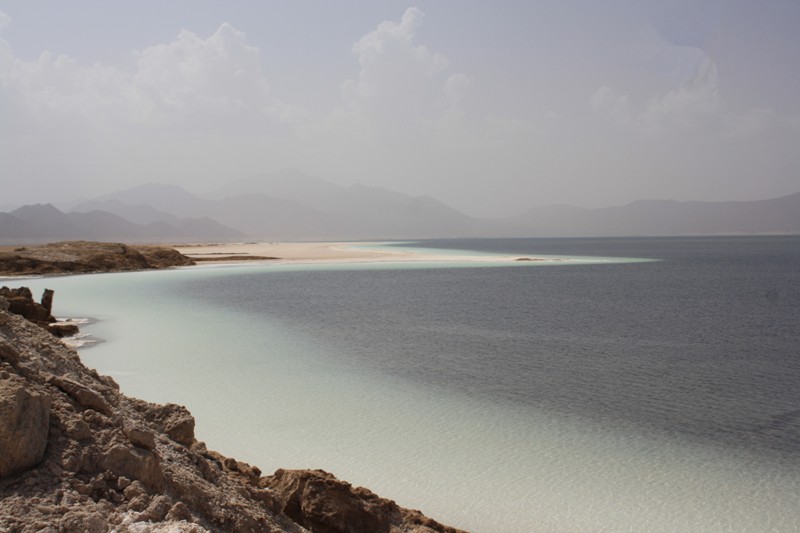Lac Assal (Caldera, Crater Lake), Djibouti
Djibouti City
Republic of Djibouti
May 5, 2011
Bonjour mes amis,
At the Djibouti Embassy in Addis Ababa, the consular officer was quite clear: You don’t need a visa to enter Djibouti. You can get a visa on arrival.
Non!
The entry process was a real pain. At the airport, I waited for what seemed like more than an hour as I was shuttled from office to office. Finally, finally, one officer made a call and some other higher ranking officer gave the OK. Then back to yet another office to watch yet another officer paste the visa into my passport. (Miracle of miracles, my luggage was still waiting for me, forlornly, on the carousel.)
The taxi driver tried to hustle me to a hotel (where I assume he would have received a nice commission) but I insisted on the hotel where I had made a reservation using email. At my hotel, they had trouble locating the reservation. (I don’t think they ever found it.)
My room was simple, spare, and noisy, very noisy. The nightclub in the basement throbbed until 3 am.
After a brief walk around this shabby, unappealing city, and after all the hassles, I began to regret my decision to come here.
My regrets are soon forgotten as I leave Djibouti City and my drive begins through the desolate desert scenery. In the distance a sand storm dances across parched plain.
The first stop was the wondrous Lac Abbe. *
Next on the itinerary is Lac Assal, 150m (490 ft) below sea level. The aquamarine crater lake is surrounded by black, dormant volcanoes and is the lowest spot in Africa. The shore line is encrusted with salt. Hence, Lac Assal.
From the lake to the mountains, I can feel my “regrets” rising to the surface once more as I travel across roads better suited for goats than motor vehicles. At one point I said “enough” of the incessant shaking and bouncing. I got out. For me, walking up the steep sandy mountain road (road?) was much more comfortable and restful. When I couldn’t breathe anymore, I got back in the van.
The Goda Mountains are the true oddity in this odd little country. Rising to 1750m (5740 ft), the mountain forests are an enormous green oasis in the middle of the scorched map of Djibouti.
Lunch is on the nearly deserted shore of the Gulf of Tadjoura, a smaller gulf at the extreme end of the Gulf of Aden. It’s a scenic spot that cries out for development. I hope the screams are silent.
The final stop is a long, slow, hot climb up the gentle slope of an unnamed volcano amidst a field of black and gray volcanic rock.
I must admit that I do have one regret. I don’t speak French. In Djibouti, the former French colony of French Somaliland, French is the default Western language after Amharic, Somali, Oromo, Tigrinya and who knows how many other tribal languages spoken in this region.
Well I do know about a half dozen words in French: un, deux, trois, lundi, mardi, mercredi. And I certainly had many opportunities to learn more. My former wife, the late Alice Dawn, was a French teacher. I have been to France a half dozen times. But I am lazy.
My driver in Djibouti spoke no English whatsoever. So how do we communicate? First I try to think of a word in Spanish (I know about two dozen words) and see if there is some similarity. I also try to think of an English word with a Latinate root. Occasionally my strategy works.
Perhaps, silence is the best communicator, especially across the spirit of the mountains and the magic of the desert.
Yet, isn’t it odd how the brain functions? Sometimes a word, even a French word, just flashes magically in my mind, rising up from some subterranean depth of memory.
My dear Alice, wherever you may be, “Merci. Merci bien!”

